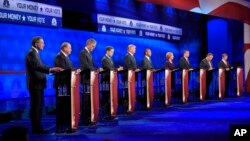The top 10 Republican presidential candidates clashed over economic policy Wednesday and also launched several personal attacks during the third debate of the primary election season.
The debate, broadcast on financial cable news channel CNBC, comes as real estate mogul Donald Trump appears to be losing his months-long grip on the race's front-runner position.
The outspoken reality television star, who now trails retired neurosurgeon Ben Carson in several national polls, appeared less brash and on the defensive compared with his performance in previous debates.
Asked by a moderator whether he is running an unrealistic "comic book" campaign, Trump responded angrily, saying, "That's not a very nicely asked question, the way you said that."
Carson, the soft-spoken political outsider, also fielded several attacks from rivals. Some were aimed at his tax plan, which he has said is inspired by the biblical concept of tithing.
"I didn't say the rate would be 10 percent. I used a tithing analogy. ... The rate would be much closer to 15 percent," said Carson, an evangelical Christian.
Ohio Governor John Kasich attacked both front-runners, slamming his opponents' tax plans as "fantasy" and saying that the U.S. "cannot elect somebody who doesn't know how to do the job."
Another key early moment occurred when former Florida Governor Jeb Bush attacked his longtime friend and fellow Florida politician, Senator Marco Rubio, for missing several Senate votes.
"Marco, when you signed up for this, this was a six-year term," said Bush. "And you should be showing up to work. I mean, literally, the Senate, what is it, like a French workweek, where you get, like, three days where you have to show up?"
Rubio shot back quickly, accusing Bush of attacking him because it was politically expedient. "Someone has convinced you that attacking me is going to help you," Rubio said to the man who in the past served as his mentor.
The other debaters were ex-Hewlett Packard executive Carly Fiorina, New Jersey Governor Chris Christie, ex-Arkansas Governor Mike Huckabee, Texas Senator Ted Cruz and Kentucky Senator Rand Paul.
Undercard debate
Earlier, the lowest ranking candidates — ex-Senator Rick Santorum, Louisiana Governor Bobby Jindal, former New York Governor George Pataki and Senator Lindsey Graham — participated in a so-called "undercard debate."
Graham used the stage to attack Trump and his "Make America Great Again" slogan. "America is great. I intend to make America strong again," Graham said.
The latest New York Times/CBS News poll shows Carson with 26 percent support among prospective Republican primary voters and Trump in second place with 22 percent. It's the first time that Trump has not been in the lead since the Times/CBS poll began ranking the candidates in late July.
Bush under scrutiny
The main debate, held in Boulder, Colorado, and broadcast on CNBC, comes as the GOP primary campaign enters a crucial phase.
The stakes seem especially critical for Bush, who recently slashed campaign spending after slipping further behind in national polls and surveys in key early states like Iowa, New Hampshire and South Carolina. Bush was busy this past week trying to reassure wealthy campaign donors.
Shrinking democratic field
The size of the Republican field stands in sharp contrast to that of the Democratic race, in which only three contenders remain: former Secretary of State Hillary Clinton, Vermont Senator Bernie Sanders and former Maryland Governor Martin O’Malley. Two Democrats dropped out last week, former Virginia Senator Jim Webb and former Rhode Island Governor Lincoln Chafee.
Vice President Joe Biden also took himself out of the 2016 race, giving Clinton a boost that has helped re-establish her as the clear Democratic front-runner. Clinton also helped herself with her strong appearance before the House Select Committee on Benghazi and a crisp debate performance the previous week.
Trump takes on Carson
In the Republican race, Trump has stepped up his attacks on Carson in recent days, accusing him of having “super low energy” in an interview with CNN. Carson responded on Fox that he didn’t want to “get in the mud pit” with Trump, but that may be harder to avoid in Wednesday’s debate. Trump told MSNBC Tuesday that he was "willing to spend whatever it takes to win."
He also said Carson would get more attention now, and "we'll see how he holds up to the scrutiny."
Trump and the Republican establishment
But Trump did well in a new Associated Press-Gfk poll in which seven in 10 Republicans surveyed said Trump was the party’s strongest general election candidate, compared with six in 10 for Carson. Sixty percent also said Bush could win the general election, while 54 percent said the same about Rubio.
Trump also got a boost recently when Politico reported that 81 percent of Republican insiders whom they check with regularly believe that the odds of Trump winning the nomination have grown measurably over the last two months.
Trump’s success continues to worry members of the Republican establishment.
Republican strategist Karl Rove, a key adviser to former President George W. Bush, wrote in The Wall Street Journal that Republicans may have to choose between a nominee who has a conservative agenda or one “reflecting populist anger,” presumably referring to Trump. Rove warned that “conservative principles” would provide a path to victory while “populist outrage alone will end in defeat.”













